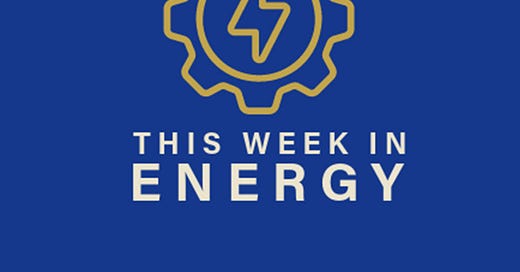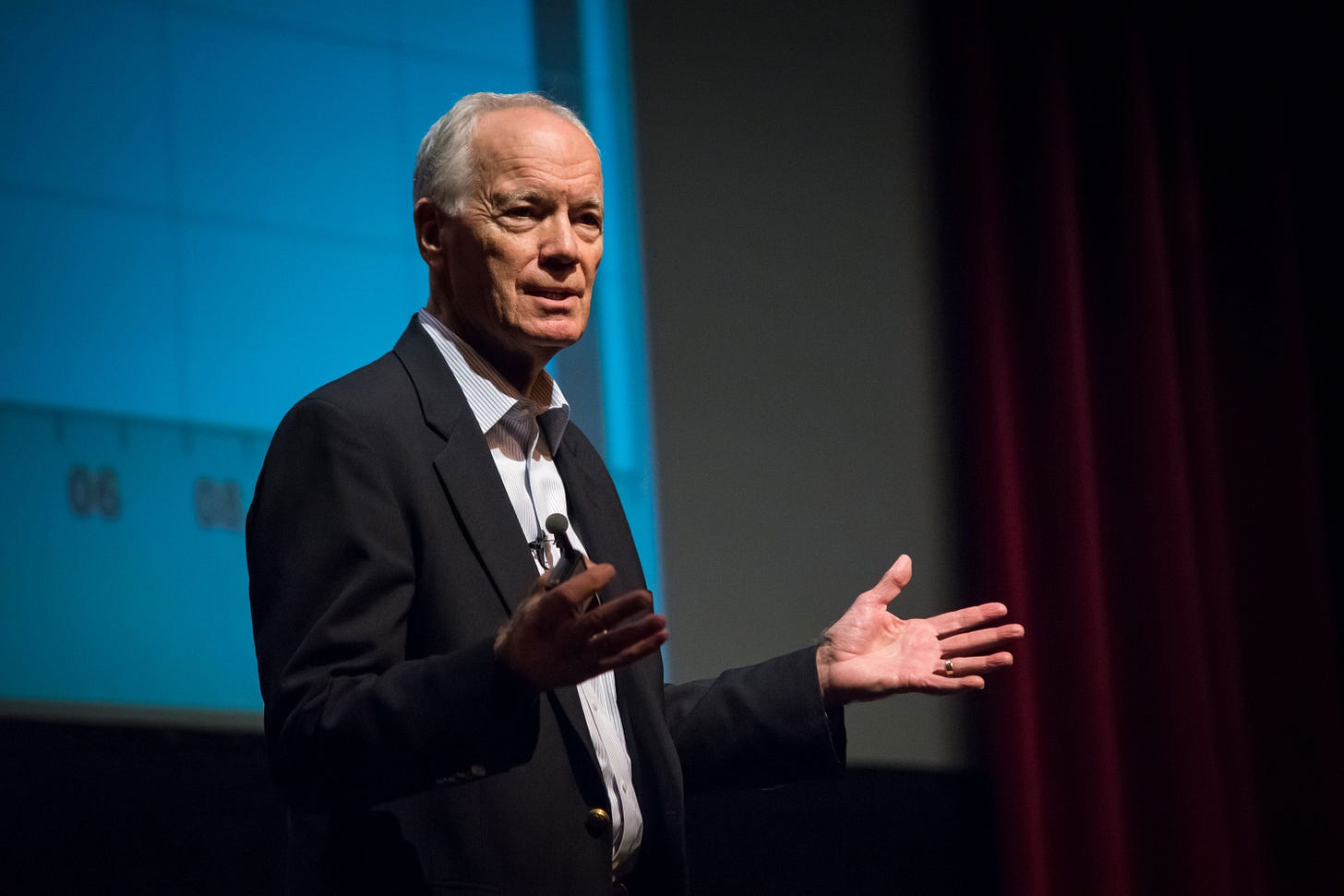Here are the Special Guest, Industry Experts and Community Leaders in the episode of This Week In Energy for December 6, 2024:
Nate Washburn, Energy Information Administration, gives an update on propane, diesel, gasoline and residential heating prices.
The average retail price for home heating oil fell 9 tenths of a cent from last week to $3.49 per gallon. That’s down 63.9 cents from a year ago, based on the residential heating fuel survey by the U.S. Energy Information Administration.
Heating oil prices in the New England region are at $3.46 per gallon down 1 tenth of a cent from last week, but down 63.5 cents from a year ago.
The average retail price for propane is $2.50 per gallon, up 1.5 cents from last week’s price, and up 6 cents from a year ago, based on the residential heating fuel survey by the U.S. Energy Information Administration. Propane prices in the Midwest region averaged $2.00 per gallon, up 2 cents from last week, and up 3 cents from a year ago.
The U.S. average retail price for on-highway diesel fuel increased to $3.54 a gallon on Monday. That’s up 0.1 cents from a week ago, based on the weekly price survey by the U.S. Energy Information Administration. Diesel prices were highest in the West Coast states at $4.16 a gallon, down 1.3 cents from a week ago. Prices were lowest in the Gulf Coast region at $3.23 a gallon, up 2.4 cents from a week ago.
Warren Martin, executive director, Kansas Strong, shares his review of Episode 4: A String of Second Chances, of the new series Landman streaming exclusively on Paramount Plus.
"The Sting of Second Chances" seems to refer to Tommy Norris's decision to rekindle his relationship with ex-wife Angela Russo, who declares her intention to leave her new husband for him. Whatever fans may think of that development, there's also storylines going on for attorney Rebecca Falcone and Tommy's son Cooper. Landman continues to do a fine job of balancing the boardroom with the oil patch, and while it does veer into some sensationalism and outrageous Hollywood-esque storylines, overall the series has become a fantastic talking point for energy education.
In the heart of Texas, roughnecks and billionaires try to get rich quick in the oil industry; Tommy Norris, a struggling executive, tries to take his company to the top during the fuel boom.
Midland-based Tommy works for a small but lucrative outfit, MTex Oil. The owner, Fort Worth businessman Monty Miller (Jon Hamm) and his wife Cami (Demi Moore).
From Sheridan and co-creator Christian Wallace, the series is based on the podcast “Boomtown” and follows the upstairs/downstairs battle for land, oil and fortune in a West Texas boomtown.
Paramount Plus is the only way to watch the series. Following the premiere, one new installment will arrive every Sunday through Jan. 12.
Current Energy Field Worker and former Tight End and Offensive Tackle Sam Grant shares stories of playing football for the University of Oklahoma Sooners.
Grant talks about the mentoring from Coach Bob Stoops, catching a touchdown pass from quarterback Baker Mayfield and what it was like playing with current NFL players Joe Mixon (RB-Cincinnati) and Mark Andrews (TE-Baltimore).
“In high school, I always liked math and science, so I figured that's what I was going to do,” Grant said.
While attending St. Edwards High School, Grant did a brief internship with Chesapeake Energy to verify he had chosen the right career path. “You're out of the office a lot, so that's what I liked about it.” Grant said with a smile.
OU's petroleum engineering program ranks among the nation's elite. OU's football program also is among the elite, which created the perfect combination for Grant. “I always wanted to get a good education,” Grant said. “Since their petroleum engineering is in the top three in the country, that was really a defining step in picking a school. Football here is the best in the country, in every which way – the best since World War II – and their petroleum engineering is the best in the country.”
Grant had an impressive backup plan had the petroleum engineering/OU combo not happened. “I would have studied mechanical engineering,” Grant said. “If I hadn't come here, I probably would have gone to Michigan and tried to work for Ford (Motor Co.). They've got mechanical engineering up there.”
OU petroleum engineer graduates reportedly have an average starting salary of over $100,000. Grant is on pace to get his bachelor's degree in four years and tries to load up on the more difficult classes in the spring and summer because football season is so time-consuming and maneuvering his class schedule gets tricky. “Some of my classes don't even fit because they're during practice time in the fall, so I have to take those classes in the summer,” Grant said.
Grant also did an internship with Duck Creek Energy, Inc. in his home state of Ohio, where he performed a research project on re-purposing well production water (saltwater brine).
Dr. Loren Scott explains the Louisiana Carbon Management Primacy powers granted by the EPA.
Louisiana is the third state—after North Dakota and Wyoming—given primary authority by EPA to issue permits for the Class VI wells used in carbon capture and sequestration (CCS). North Dakota approved its fourth well permit last spring, and an ethanol producer is already capturing and storing carbon there.
Texas, West Virginia, and Arizona all have similar requests into EPA. The federal agency took 4 years to approve Louisiana’s bid for primacy.
Proponents say giving more states primary authority to issue permits will accelerate approval of new projects essential to reduce CO2.
The Inflation Reduction Act of 2023 fueled additional interest. Companies can receive a tax credit up to $85/ton to capture and permanently store carbon about a mile below the earth’s surface.
As applications continue to flow in, EPA now has a backlog of Class VI well-permit applications, including about 20 from companies operating in Louisiana, an EPA spokesman said Jan. 4 in a written statement. Under the new agreement, Louisiana will handle all new Class VI applications in the state, and EPA has begun discussing handover of permit applications already submitted, the EPA spokeswoman said.
Louisiana is an emerging hub of carbon management deployment working within the regional Gulf Coast context.
In the state, there are 324 facilities that qualify for the 45Q tax credit, ranging from various power generation sources, refineries, and more industrial sectors. The emissions from these 320 facilities represent an estimated 99.7 percent of all the emissions from facilities in the state.
Louisiana recognizes the potential that carbon management presents to curb these emissions while strengthening the state’s economic base. As such, Louisiana has enacted policies to further deployment in the state and applied for Class VI primacy from the Environmental Protection Agency.
Stuart Turley, CEO and Podcast Host wants to Eliminate Energy Poverty.
“So my research started 15 years ago. the energy industry was not political. Not even close to where it was today. In fact, when I was growing up, the only thing about politics was the gas prices,” The Crude Life founder and host Jason Spiess said. “And by the way, this was after Exxon Valdez had like a big spill. And there was more jokes about a drunk sailor than there was about problems with the oil spill, okay?”
Turley agreed with Spiess on the level of politics involved in energy today.
“I want to eliminate energy poverty,” Turley said. “The only way that you can eliminate energy poverty is to have low cost, abundant energy that has the least amount of impact on the environment and sustainable through not printing money. And by not printing money, it means it can be fiscally sustainable. I’m all in on all forms of energy, oil, gas, nuclear, wind, solar. It does not matter to me. Let’s take care of humanity first.”
The interview also cites examples of people and companies who are becoming leaders in energy (and humanity) rather than specifically oil and gas. Chris Wright, CEO, Liberty Energy is one of the ones cited.
“He is a humanitarian,” Turley said. “When I met Chris Wright, maybe four or five years ago, and I saw his presentation on humanitarian and delivering everyone from eliminating energy poverty. I absolutely think the world of Chris Wright.”
Carbon management and the integration of Ag and Energy are also discussed in detail.
“I believe that anybody that is going to take government funds is going to need to get into that carbon market, even if carbon is either right or wrong, whether or not we need enough CO2.” Turley said. “I think CO2 is not the bad man in the room, my personal opinion but those that are going to manage that are going to be able to use government funds and survive politically. So Oxy, Exxon, Chevron are all doing great things.”
Public relations in energy, oil, gas and community engagement is also discussed in detail.
Marlette Dumas, bp, shares her journey on what it is like working in Houston, TX, in the oil and gas industry as an African American (black) woman.
She initially had wanted to venture into renewable energy, but that wasn’t a popular idea then. Plus, when Marlette was starting out, there were even less females in the industry than there are now. Even so, Marlette pushed forward and eventually began her career as a Facilities Engineer BP in Houston, TX.
“And I thought that renewables was the way to go at the time, but that was like 25-30 years ago and it hadn’t quite caught on yet. So I thought, I still wanna be in energy’ and that’s when I began to meet companies like BP and Shell and I just naturally gravitated toward mechanical engineering on the projects side.”
After finding a home working for BP, Marlette still had some struggles as a female in such a male dominated world. There were naturally some bumps along the way, but throughout the journey Marlette was able to grow her network and gain positive traction by working hard and doing her best. She did however talk a little about bringing a more “male” energy in the way she chose to dress and present herself in order to allow her voice to be heard – even though Marlette is a highly education woman in the field of Mechanical engineering.
“So I really had to just bring a mentality that ‘hey, just be present’ and try to put my ideas forward and put myself forward even though it was not in the environment that was welcome at the time. It was not very welcome but you still have to figure out how to dig deep and do it anyway.”
Joe Sinnott, CEO, Witting Partners and host of The Energy Detox Podcast airs his 100 episode of The Energy Detox Podcast
Celebrate Election Detoxification Day with Episode 100 of The Energy Detox podcast, which lays out two tools that can help you better manage the toxicity faced by oil & gas leaders (...or pretty much anyone subjected to the last several months of election-related toxicity).
Sinnott gives a short recap of the event that celebrated the first successful hydraulic fracturing (fracking) operation in the Marcellus Shale play that took place in 2006.
The first frac in the Marcellus was carried out by Range Resources Corporation in Washington County, Pennsylvania. This marked the beginning of large-scale development in the Marcellus Shale, a region within the Appalachian Basin known for its vast natural gas reserves.
The operation utilized horizontal drilling combined with hydraulic fracturing, a method that involves injecting fluid at high pressure to create fractures in the rock, allowing natural gas to flow more freely.
This pioneering effort demonstrated the economic viability of extracting natural gas from shale formations and sparked a boom in shale gas development across the region, significantly influencing the U.S. energy landscape
“This continues to produce tremendous amounts of gas and providing tremendous amounts of opportunities and jobs for people,” Sinnott said. “And again, like we talked about much earlier in this conversation, bettering human lives, not just here in Pennsylvania, but really throughout the country, and you know, even beyond the borders of the United States.”
To contact Sinnott, reach out via LinkedIn or his website.
This Week In Energy is a newsmagazine radio podcast which does qualify for FCC mandated Public Affairs time. This Week In Energy addresses issues of public interest, such as safety, education, poverty, environment, mental health, and/or employment. Published files and recordings of interviews available as public files to increase accessibility to the public and to ensure the security of information.
Everyday your story is being told by someone. Who is telling your story? Who are you telling your story to?
Email your sustainable story ideas, professional press releases or podcast submissions to thecontentcreationstudios(AT)gmail(DOT)com.
CLICK HERE FOR SPECIAL PARAMOUNT + DISCOUNT LINK
The Agency is an American espionage thriller television series for Showtime produced by George Clooney and Grant Heslov and starring Michael Fassbender. The series premiered on November 29, 2024, and is based on the critically acclaimed French series Le Bureau des Légendes, created by Éric Rochant, that aired on Canal+ from 2015 to 2020.
The Agency is now streaming on Paramount+





















Share this post